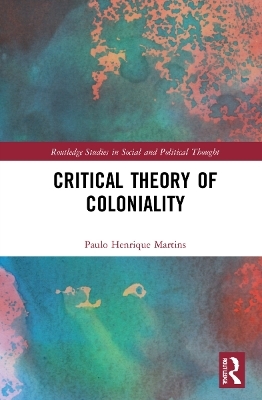
Critical Theory of Coloniality
Routledge (Verlag)
978-1-032-11885-7 (ISBN)
CTC expresses the emergence and historical actuality of a set of intellectual fields aimed at denouncing domination and promoting emancipatory ideas at the borders of colonial capitalism. The book argues that the actuality of the CTC relies on the importance of valuing theoretical and methodological pluralism in the context of the necessary redefinition of the directions of global society. It reveals a plural reflection of scientific, moral, and aesthetic character in different areas of former planetary colonisation such as Asia, Africa, and America but also on the borders of Europe.
This book is aimed at researchers and students in the social sciences as well as in interdisciplinary studies. It is attractive to those who are interested in the plural development of theoretical criticism outside the European universe and who seek to understand how capitalist power has metamorphosed with planetary coloniality. Considering this book implies important reflections on topics such as development, modernity, tradition, imperialism, dependency, and democracy, it is interesting to specialists in development issues, international relations, and policymakers.
Paulo Henrique Martins is a Professor of Sociology at the Federal University of Pernambuco, Brazil. He holds a PhD in sociology from the University of Paris I - Panthéon-Sorbonne. He was former president of the Latin American Sociological Association (ALAS); and Researcher of the National Council for Scientific and Technological Research (CNPq) in Brazil.
Introduction: The emergence of a Critical Theory of Coloniality
Part I: Postcolonial Epistemologies
1. Colonial Capitalism and Theoretical Criticism: Intersections between the Global South and the Global North
2. Critical Theory of Coloniality and Internal Colonialism
3. Narratives of the Crisis: Between neoliberal recoloniality and the versions in dispute
Part II: Power and Knowledge in Peripheral Societies
4. Sociological Critique of Oligarchic Power
5. Impasses of development, sociological knowledge and uncertainties of peripheral societies
Part III: Democratic Utopias
6. Thinking about the convivialist heterotopia: Territory, love and the common good
7. Bien Vivir and Postcolonial Democracy: The Case of Indigenous Communities in Andean America
Conclusion
Critical Theory of Coloniality: Towards a plural, decolonised, cosmopolitan and border critical theory
| Erscheinungsdatum | 14.04.2022 |
|---|---|
| Reihe/Serie | Routledge Studies in Social and Political Thought |
| Verlagsort | London |
| Sprache | englisch |
| Maße | 156 x 234 mm |
| Gewicht | 721 g |
| Themenwelt | Geisteswissenschaften ► Philosophie ► Erkenntnistheorie / Wissenschaftstheorie |
| Sozialwissenschaften ► Politik / Verwaltung ► Politische Systeme | |
| Sozialwissenschaften ► Soziologie ► Allgemeines / Lexika | |
| ISBN-10 | 1-032-11885-7 / 1032118857 |
| ISBN-13 | 978-1-032-11885-7 / 9781032118857 |
| Zustand | Neuware |
| Informationen gemäß Produktsicherheitsverordnung (GPSR) | |
| Haben Sie eine Frage zum Produkt? |
aus dem Bereich

![Was heißt Denken?. Vorlesung Wintersemester 1951/52. [Was bedeutet das alles?] - Martin Heidegger](/media/113619842)
